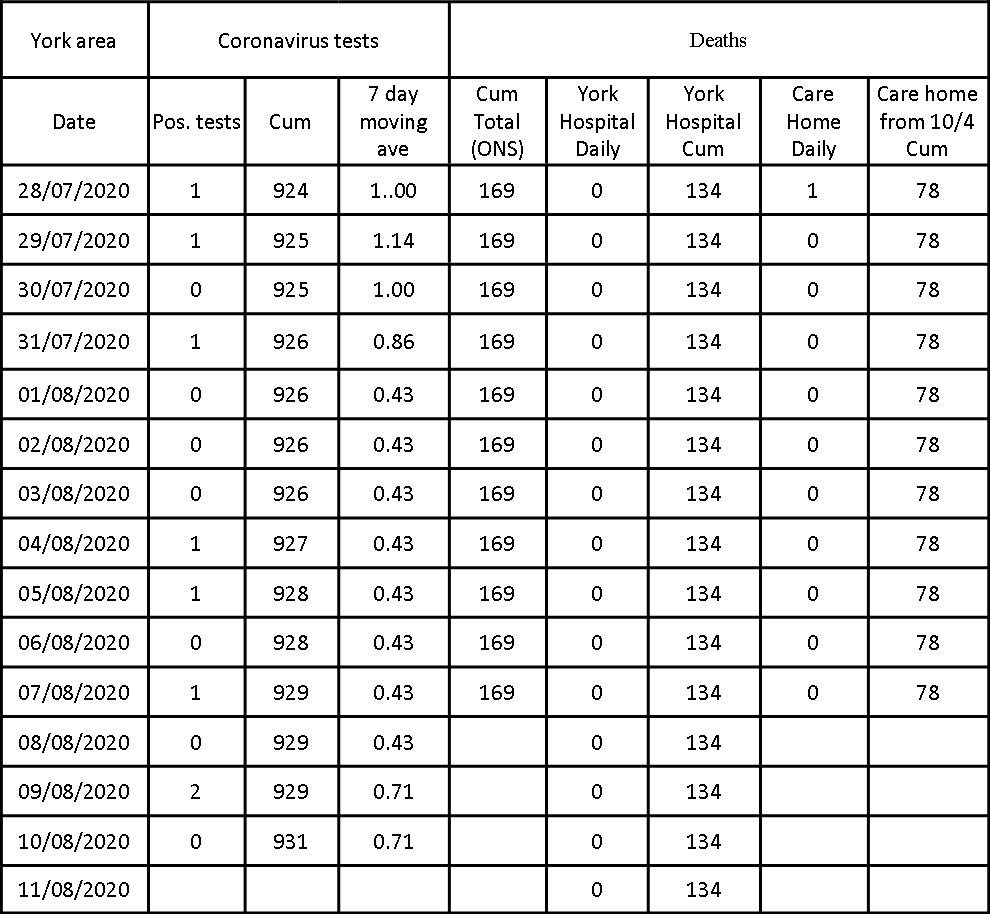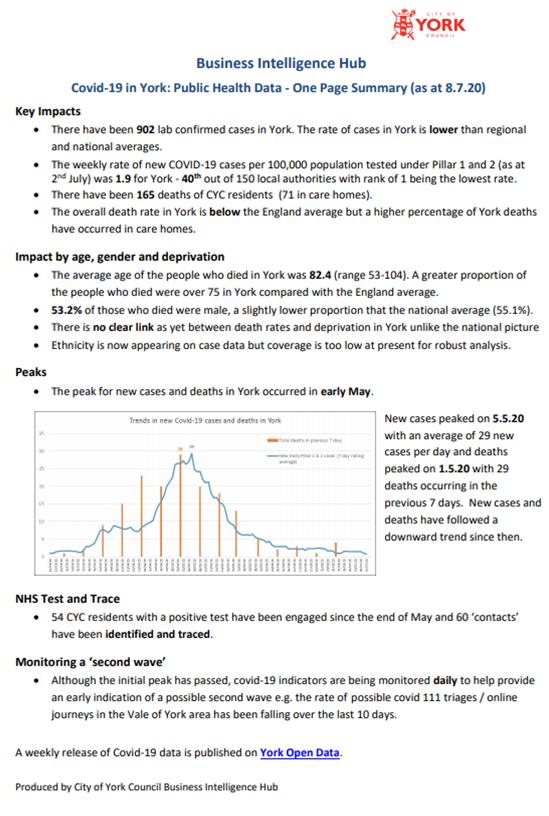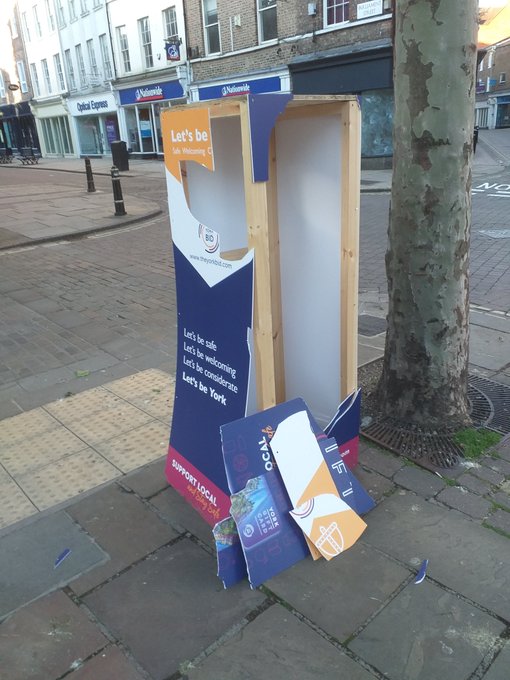Deaths and test results
The latest government figures confirm that there have been no more deaths recorded in York care homes this week. The cumulative total remains at 78.
There have been no additional COVID-19 related deaths recorded in the City. The cumulative total remains at 169
The York Councils public heath director has been quoted in the media saying that there are four Coronavirus patients currently in the York hospital. Two of these are in the Intensive Care Unit. The figures have not yet been added to the Open Data web site.
As predicted earlier in the week, the York Council are to undertake their own “track and trace” system. It will be in place before the new school term commences. A meeting yesterday was told that “there have been 97 positive Covid-19 cases registered with the test and trace scheme in York – with 82 of them contacted, leading 176 contacts to be identified. Of those, 113 have been traced“. Again these figures haven’t been added to the Open Data web site

The test and trace system is to “go local” as the Government appears to acknowledge that the national system, described as “world beating”, is not fit for purpose.
It follows intense criticism over the reach of the national centralised service, which was set up an awarded to private companies, and its failure to tap into local knowledge to tackle outbreaks of the coronavirus in England.
Last month, it was revealed the system was failing to reach more than half the contacts named by infected people in areas battling acute outbreaks of the virus.
On Monday this week, DHSC announced the NHS Test and Trace programme will now provide local authorities across England with a dedicated team of contact tracers to ensure that as many people as possible are being reached, in what the department described as a “new way of working” and a “more tailored service”.
This could mean people who have been in contact with confirmed coronavirus cases may get a knock on their door if tracers are unable to reach them over the phone.
“As the approach becomes more locally targeted the national service will adjust,” DHSC said. “NHS Test and Trace will reduce current extra capacity and reduce the number of non-NHS call handlers.”
They continued: “Data on the virus continues to be actively monitored through PHE and the Joint Biosecurity Centre so that staff numbers can be quickly scaled up, or down, depending on requirements for the national service and as part of winter preparations.”
An effective system of contact tracing is widely viewed as critical in keeping down the transmission rate of the virus by reaching out to those who have come into close contact with an individual who has tested positive, and urging them to self-isolate for 10 days.
However, last week’s figures showed that thousands of people are still not being reached by the test and trace program mme and the head of outsourcing company Serco, which employs over 10,000 of the tracers, admitted up to a fifth of contacts may be untraceable.
The data added that the national call centers were struggling to reach contacts, with only 56 per cent of close contacts handled online or by call centers being reached and told to self-isolate to stop the spread of the virus.
In stark contrast, a local contact tracing system set up in Blackburn with Darwen Council had reached 90 per cent of the people the Government’s national system was failing to contact in an area with one of the worst Covid-19 infection rates.
Council to tackle digital exclusion in Coronavirus response
City of York Council will be hosting a digital inclusion workshop with Citizens Online and Explore Libraries this week, to bring city partners together to share insight and best practice .
Going forward in partnership the aim is to join up activity, share information and resources and encourage collaboration.
Throughout lockdown, the Council have been working in partnership with organisations across the city to promote digital inclusion for residents and tenants who lack connectivity or access to digital devices.
As facilities such as libraries and the council’s West Offices were required to close at the beginning of lockdown, residents who did not have internet access or computers at home were no longer able to access these public facilities. As part of our emergency response to the impact of Coronavirus, the council and partners expanded and initiated a variety of schemes and work to address the growing need for internet access. These schemes included:
- Eligible residents who lack internet access at home have been supported through lockdown with devices such as smart phones and laptops (plus data) through York’s emergency funding scheme. Households in need of devices were identified in partnership with support workers and charities across the city.
- Around 50 laptops have been loaned by York Learning to learners wanting to continue their studies during lockdown who didn’t have the equipment to do so. Those already on accredited courses such as apprenticeships, computer skills and functional skills courses in maths and English have been prioritised.
- Independent Living Centre tenants without online devices have been provided with smartphones and three months of mobile data to keep in touch with friends and family, and to ensure they can order any food and prescriptions they need. Where they have been allocated, the tenants are regularly video calling, ringing and texting friends and family members which, they say, has been a lifeline. When the time-limited contract expires, tenants can continue to use the phone when they buy and add their own sim cards. This means they and staff can also keep in touch which helps break down isolation.
Throughout lockdown, York’s superfast broadband network has also been further extended to now reach 72% of the city.
Residents and businesses reminded about financial support
City of York Council is reminding residents and businesses that support is available for those who are currently in council tax or business rates arrears due to the coronavirus pandemic.
Over the next week we will be contacting people who are currently in arrears with their council tax or business rates offering support and information
Revenue from council tax and business rates is essential to ensure the council can continue to provide a wide range of services to support residents, our most vulnerable citizen and businesses across the city.
Several support schemes are currently in place, including:
- Council Tax Support – the amount people get is based on their household income and savings, so are likely to qualify if on welfare benefits or a low income.
- Council Tax Discretionary Reduction Scheme – provides extra assistance for people who are unable to pay their council tax bill. People can apply for this reduction whether or not they are eligible for, or receive Council Tax Support.
- Some people can get a discount on their Council Tax bill, to check what discounts are available please visit www.york.gov.uk/counciltax



